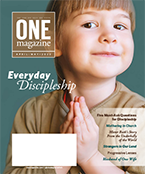
April-May 2022
Everyday Discipleship
------------------
|





Reaching Generation Z, Part Two
By J. Matthew Pinson
In my last article, I discussed a recent study from Springtide Research, “The State of Religion and Young People 2020.” The study was featured in a conversation between Mark Bauerlein and sociologist Dr. Josh Packard during the First Things podcast entitled The Loneliest Generation.
The study underscores that Generation Z, while lacking trust in existing social institutions, longs for “relational authority”—a concept that embodies the best of institutional authority and relationality.
They’re Not Looking for a Buddy
Packard and his research team assumed they would hear young people in their study say they were tired of adults telling them what to do and other similar sentiments. Instead, these students said they don’t want adults to be their buddies. They want adults to be mentors, a source of authority in their lives.
Amazingly, 24% of young people without strong adult mentors said they had no meaning or purpose in life. But when they have only one strong adult mentor, that number drops to 6%! Yet between one-fourth and one-third of young people surveyed said they didn’t have a single trusted adult in their lives, including their parents.
“Increased Connectivity, Decreased Connection”
The study underscored numerous other studies revealing today’s young people are the loneliest segment of our society, unlike previous generations where older people were the loneliest people. Packard and Bauerlein note this statistic is counter-intuitive because of younger people’s hyper-connectivity on social media.
Just as we need to be careful not to jettison institutions, we also need to be careful not to jettison in-person relationships. The study showed while members of Generation Z have many acquaintances on social media, those do not equate to real relationships or true embodied friendships. While they have increased connectivity, they have decreased connection.
This calls into question what the social media industry is fostering—the contrasting idea that social media increases relationships and community and decreases loneliness. This study and others reveal time spent on social media is directly correlated to increased feelings of isolation and loneliness. (Of course, we’re not saying to do away with social media either; we’ve just got to reduce obsession with and addiction to it and figure out how to ask serious questions about it. Facebook’s own internal research—recently brought to light by a whistle-blower—should heighten this awareness.)
As Packard said, social media is “giving adults a false sense of security about how plugged-in to social life their kids are. They see them on devices and with social media, and they incorrectly assume that they are handling it okay. It’s one thing when your kids are playing in the front yard, and you hear them. But if you’re not engaged with how they make friends and set rules and norms online, you can’t assume that they’re not lonely and isolated, because a lot of times they are.”
In addition to parents, much of the solution to loneliness, isolation, and lack of meaning and purpose used to be found in social institutions, especially religious institutions, Packard argues. That is no longer the case. Yet again, the answer is not to de-emphasize institutions but to reinvest our institutions with a renewed emphasis on relational authority—the combination of authentic relationships and mentoring by an adult who has integrity.
More on the “Nones”
As an aside, the study also casts doubt on the way some people have interpreted “the rise of the Nones.” Packard forcefully argues that the rise of the Nones is more about growing anti-institutionalism and not necessarily a move away from religion. Along with other researchers, Packard and his team do not believe religious affiliation and non-affiliation, in connection with the question of “Nones,” are meaningful categories.
Much higher rates of young people now claim to be strongly religious but not affiliated with a particular religious group. The reality, Packard explains, is much more complicated than the two checkboxes of religiously affiliated and non-affiliated suggest. Young people who want to “engage in worship or read sacred texts,” etc., might well list themselves as religiously unaffiliated on a survey.
Many such young people, however, also claim to have strong “religious values” and “live them out,” “go to worship,” etc. It’s more about an anti-institutional mindset rather than an anti-religion or anti-Christian one, Packard insists. In fact, he says, “religious leaders should see this as an opportunity.” The last thing we need to do in responding to anti-institutionalism, he asserts, is to indulge it or move away from strong, vibrant social or religious institutions.
A Wonderful Opportunity
Packard concludes: “There’s a whole lot of young people that you might have thought were shut down to the very conversation about religion. And they’re not. They’re open to the conversation. But they’re not going to have it with you because you are the pastor of such-and-such church…. They’re going to have that conversation with you because you’re Ben, and they know you because you’ve been around their lives. I do think that is a potential opportunity.”
We must have authority without authoritarianism, Packard explains. We must realize the days of young people respecting authority just because of a title like pastor, youth pastor, or teacher is a thing of the past. In this “culture of distrust around social institutions,” he argues, the more leaders rely on their position, title, or expertise rather than relational authority, the less effective they will be.
Still, Packard stresses, though Gen-Z sees personal relationships with adults of integrity lacking in many social institutions, including religious ones, these young people still regard expertise and authority as a necessary ingredient. Thus, the study shows, a leader’s position and expertise are still crucial, but they’re nothing without personal relationships and integrity.
Listening
The most important thing we can do to invite the members of Generation Z into the conversation about faith, the study shows, is to listen to them intently. Packard recommends asking one or two follow-up questions, saying “Tell me more about that.” This is because young people are tempted to assume you’re not really listening and don’t really care. They won’t listen to your experience and expertise as an adult if they think you don’t care and aren’t really listening.
I think Bauerlein and Packard are exactly right: “You can be very tough with kids if you’re attentive, if you’re there, if you’re listening, if you’re offering yourself. You can get a lot of trust that way.”
Diagnosing the Problem, Rediscovering the Solution
I encourage readers to listen to this podcast, examine this study, and share these statistics and conclusions with others who work with young people. The worst thing a leader can do when faced with a problem is to misdiagnose it. When we inadvertently do this, we usually not only fail to help the problem; we make it worse.
It’s crucial not to misdiagnose the problem of why young people are checking out of church, because if we spend all our time on a well-intentioned but wrong solution, we’ll find ourselves drifting further from the real solution.
Most of all, we must remind ourselves the ultimate answer—the ultimate solution—is found in God’s ordinary means of grace revealed to us in Scripture. That’s what struck me as I listened to Packard and Bauerlein. What they’re saying (and what the research is showing) about the solution is “back to the future”: sharing and teaching biblical truth, in the context of deep, personal, embodied relationships, with adults whose lives are marked by integrity.
This ancient strategy that emerges from this cutting-edge study is found in the Bible and the way God’s people have interpreted it and lived it out over 20 centuries. And it’s the solution to the most profound problems of people young and old today. May God guide and bless our efforts to engage and reach each new generation with His timeless and always relevant truth.
About the Author: Dr. J. Matthew Pinson has been president of Welch College since 2002. Learn more: www.Welch.edu.
|
|

